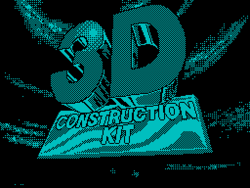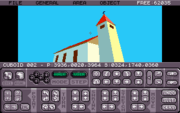3D Construction Kit
| 3D Construction Kit | |
|---|---|
 ZX Spectrum Title screen | |
| Developer(s) | Incentive Software (Amiga and ZX Spectrum versions), Domark (other versions)[1] |
| Publisher(s) | Domark, Incentive Software (MS-DOS version only)[1] |
| Designer(s) |
Programmers: Paul Gregory, Sean Ellis Graphic artist: Eugene Messina Other artists: Chris Andrew, Ian Andrew, Kevin Parker[2] |
| Engine | Freescape |
| Platform(s) | Acorn Archimedes, Amiga, Amstrad CPC, Atari ST, Commodore 64, MS-DOS, ZX Spectrum |
| Release |
|
| Genre(s) | Game creation system |
| Mode(s) | Single player |
3D Construction Kit (US, Canada and Israel release title: Virtual Reality Studio[3]), also known as 3D Virtual Studio, is a utility for creating 3D worlds in Freescape. Developed by Incentive Software and published by Domark, it was released in 1991 on multiple platforms. The game originally retailed for £24.99 for the 8-bit version, and £49.99 for 16-bit version, in the United Kingdom. A sequel, 3D Construction Kit II, was released in 1992, but only available on Amiga, Atari ST and MS-DOS.
Features

Incentive Software had released games using the Freescape engine before, but with 3D Construction Kit, the company took the concept to a whole new level, giving users the ability to create their own worlds and games. In 3D Construction Kit, interaction with the world is usually limited to a cursor controlled with the keyboard, offering the possibility of interaction with nearby objects.
The kit has a very simple graphical user interface, allowing users to create and manipulate objects within the game's 3D environment. Primitives such as cubes, cuboids and pyramids can be easily created and edited to be scaled and placed on the 3D world. Colours can be selected for individual elements, making the free roaming worlds more varied and complex. The user-created virtual world is divided into areas, reducing the processing power required to render objects. The areas can be as large as the memory allows.
Animations may also be added to the primitives, either by looping or simple moving attributes to objects, to create simple, although seemingly advanced, animations.
In order to make games rather than worlds, 3D Construction Kit also allows for the addition of conditions, using the very simple-to-program Freescape Command Language (FCL). Sensors, animations and interactivity with the elements can be added with relative ease. Players are able to move around the virtual worlds by walking or flying. Elements such as proximity sensors triggering events, enemies making the player appear in another zone of the game when hit, and the ability to activate switches in order to open doors, make the worlds created with 3D Construction Kit come to life and add a level of uncertainty to the gameplay.
The interface of the game is customisable; by adding a 320x200, 16-colour IFF screen created with any image editing program, the games created with this tool could be made to look more professional.
Versions
3D Construction Kit was originally released on the ZX Spectrum in early 1991. Later the same year it was adapted for numerous other platforms, including versions for the Amstrad CPC, Atari ST, PC as well as the Commodore 64 and Commodore 128. A version for the Amiga was released on June 1, 1991[4] and proved relatively popular with computer users. The Acorn Archimedes[5] was released in January 1992. The different versions of the game varied slightly in their user interface, which was progressively improved with each successive release.
The 3D Construction Kit packages came with a 30-minute video tape, featuring an introduction and a tutorial presented by Ian Andrew, the original designer of the Freescape system.[6]
3D Construction Kit is available in five language editions: English, German, French, Spanish and Italian.
Specifics
Freescape Command Language
3D Construction Kit employs the Freescape Command Language (FCL), which allows functions to be performed when certain conditions occur within the Freescape environment. On 16-bit versions, these commands can be used in any of three places:
- Object conditions: executed when some kind of interaction with the specified object takes place
- Area conditions: executed each frame while the viewpoint is within the confines of the specified area
- General conditions: executed every frame regardless of the viewpoint position.
The 8-bit versions do not allow the creation of object conditions, but add procedures – conditions that can be executed from general or area conditions but are not otherwise triggered by the game engine.
Although the 8-bit and 16-bit versions of the language are similar, they are not interchangeable.
Sound
The 16-bit 3D Construction Kit has a standard sound bank which can store up to 32 sounds. Sounds 0–6 are predefined. These are: "00 Laser out", "01 Shooter", "02 Bump", "03 Explosion", "04 Ping", "05 Smash" and "06 Clang". The user can add up to 26 other sounds of their choosing.
The 8-bit version has a sound bank of 12 predefined sounds.
Reception
| Reception | ||||||||
|---|---|---|---|---|---|---|---|---|
| ||||||||
The ZX Spectrum version was critically acclaimed, receiving 92% from Your Sinclair[7] and a Crash Smash from CRASH.[9] The Commodore 64 version received a 100% rating from Your Commodore.[8] The Amiga version received scores above 90% by three magazines: The One,[10] Amiga Format and Amiga Action.[8][11] Computer Gaming World was much less positive, warning that the PC version "is not for the fainthearted or the boot-up-and-play-without-looking-at-the-manual crowd". The magazine criticized the software only providing one large precreated object and the inability to reuse elements from the sample provided game, and stated that "the Freescape world itself [is] unsatisfying ... a heartless and barren place ... long abandoned by all forms of life". It concluded, "Users with no interest in programming are advised to stay well away".[12]
References
- 1 2 3D Construction Kit release info
- ↑ Hall of Light: 3D Construction Kit
- ↑ Moby Games: 3D Virtual Studio
- ↑ GameSpy: 3D Construction Kit
- ↑ 3D Construction Kit User Group Fanzine - Issue 5
- ↑ 3D Construction Kit Tutorial VHS Video - YouTube
- 1 2 Leach, James (August 1991). "Your Sinclair" (68). Future Publishing: 14.
- 1 2 3 http://www.mobygames.com/game/virtual-reality-studio
- ↑ Roberts, Nick (May 1991). "CRASH" (88): 39.
- ↑ http://amr.abime.net/review_5303
- ↑ http://amr.abime.net/review_6097
- ↑ Carter, Tim (August 1992). "A Look at Domark's Virtual Reality Studio". Computer Gaming World. p. 60. Retrieved 3 July 2014.
External links
- 3D Construction Kit at MobyGames
- Dedicated 3D Construction Kit website with homebrew games
- 3D Construction Kit on the Amiga at The Hall of Light (HOL)
- Virtual Reality Studio Resource
- 3D Construction Kit at SpectrumComputing.co.uk